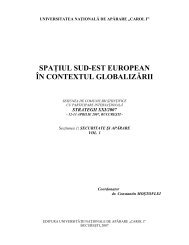Impact strategic nr.6-7 - Centrul de Studii Strategice de Apărare şi ...
Impact strategic nr.6-7 - Centrul de Studii Strategice de Apărare şi ...
Impact strategic nr.6-7 - Centrul de Studii Strategice de Apărare şi ...
- No tags were found...
You also want an ePaper? Increase the reach of your titles
YUMPU automatically turns print PDFs into web optimized ePapers that Google loves.
PUNCTE DE VEDERE<br />
2<br />
Buzan, Barry, “Popoarele, statele <strong>şi</strong> teama. O agendă pentru studii <strong>de</strong> securitate internaţională în epoca <strong>de</strong> după Războiul Rece”, Editura<br />
Cartier, Bucureşti, 2000, p. 34.<br />
3<br />
ibid., p. 31.<br />
4<br />
ibid., p. 31.<br />
5<br />
Staş, Marian <strong>şi</strong> Păun, Vasile, “Coordonate manageriale <strong>şi</strong> tehnologice în spaţiul <strong>de</strong> conflict informaţional”, Editura Pro Humanitate,<br />
Bucureşti, 1998, p. 18.<br />
6<br />
Gid<strong>de</strong>ns, Anthony, “A treia cale <strong>şi</strong> criticii ei”, Editura Polirom, Ia<strong>şi</strong>, 2001, p. 72.<br />
7<br />
<strong>Centrul</strong> <strong>de</strong> <strong>Studii</strong> <strong>Strategice</strong> <strong>de</strong> Securitate, “Integrarea euroatlantică. Priorităţi post-Praga”, Editura Aca<strong>de</strong>miei <strong>de</strong> Înalte <strong>Studii</strong> Militare,<br />
Bucureşti, 2002, p. 74.<br />
8<br />
ibid., p. 34.<br />
9<br />
Pentru acest paradox, vezi <strong>şi</strong> paradigma alegerii raţionale din cadrul ştiinţelor politice, ca abordare analitică ce exprimă un comportament<br />
politic al grupurilor cu referire la <strong>de</strong>cizii politice conştiente făcute <strong>de</strong> indivizi care caută câştiguri maxime <strong>şi</strong> pier<strong>de</strong>ri minime. Mo<strong>de</strong>lele <strong>de</strong><br />
alegere raţională <strong>de</strong>vin preţioase ca instrumente analitice în măsura în care presupunerile lor <strong>de</strong> raţionalitate aproximează realitatea.<br />
10<br />
Schelling,Thomas C., “Strategia conflictului”, Editura Integral, Bucureşti, 2000.<br />
11<br />
Pentru Thomas C. Schelling, conceptul <strong>de</strong> strategie este cel preluat din teoria jocurilor <strong>şi</strong> este folosit pentru a sublinia inter<strong>de</strong>pen<strong>de</strong>nţa<br />
<strong>de</strong>ciziilor luate <strong>de</strong> competitori <strong>şi</strong> a aşteptărilor lor referitoare la reacţiile celorlalţi.<br />
12<br />
ibid., pp. 14-15.<br />
13<br />
Onişor, C., Vasile Ozunu, M., Oprea, G., “Elemente <strong>de</strong> artă <strong>strategic</strong>ă românească”, Fundaţia Colegiului Naţional <strong>de</strong> <strong>Apărare</strong>, Bucureşti,<br />
2001, p. 36.<br />
14<br />
Buzan, Barry, op. cit., p. 21.<br />
15<br />
Teoria jocurilor reprezintă un ansamblu <strong>de</strong> gândire preocupat <strong>de</strong> strategiile unei <strong>de</strong>cizii raţionale în situaţii <strong>de</strong> conflict <strong>şi</strong> <strong>de</strong> competiţie,<br />
The <strong>de</strong>bates upon the security sources and their potential - which generate a certain kind of “superiority” sense - as well as<br />
discussions on the security area which involve various actors (states, corporations, social groups, individuals) willing to get in touch,<br />
are nowadays at a turning point.<br />
The actual security structures still preserve the state as a main actor for the exercise of the political authority. On the other hand,<br />
no state can function in a medium of isolation.<br />
On the contrary, state structures can only be functional through their active relations with other states, other actors on the<br />
international arena (NGOs, international organisations and institutions, corporations etc.), so that their relationships would gain a<br />
tantamount importance for the international security architecture.<br />
In the potential analysis framework, it is necessary to pay attention to the security background characteristics that affect the<br />
actors’options. The risks, threats and vulnerabilities analysis may point out some vectors of the power management and distribution<br />
(that is the power potential) which generate a series of relationships within the security area. In a way or another, some of the<br />
security threats origins are the power based authorities conflicts. Therefore we can say the present security environment promotes<br />
competitive attitu<strong>de</strong>s and actions.<br />
The coexistence of this power based authorities can be perceived, meantime, as a security source and an insecurity one as well.<br />
Thus, the potential of the power balance may represent either a peace pillar or a conflict generator and in this way appears the<br />
polarity of two concepts: “security potential” - “insecurity potential”.<br />
Previous questions referring to the relation between security or insecurity potential and the balance types in the international<br />
security architecture framework seem to regain their importance. Thus, we can talk about a bipolar or a multipolar equilibrium.<br />
However, within any type of security equilibrium, any actor that is part of the international arena “power game”, either loses or<br />
gains some “advantages” for its potential, may damage the existent balance.<br />
184 IMPACT STRATEGIC nr. 1-2/2003


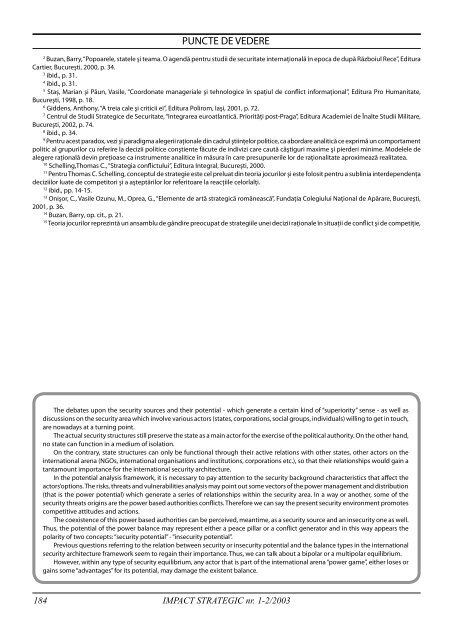

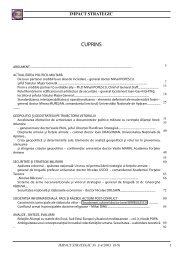
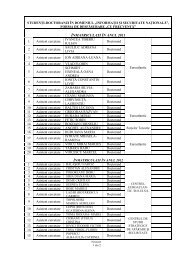
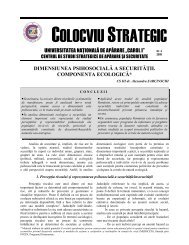
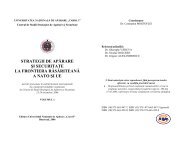
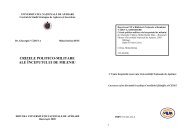


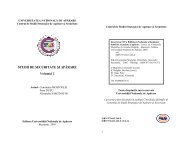
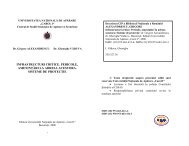
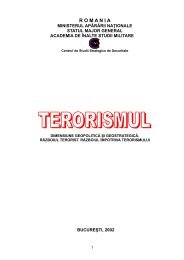
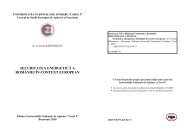
![„CAROL Nr 4 [29]/2008](https://img.yumpu.com/53801719/1/184x260/carol-nr-4-29-2008.jpg?quality=85)
